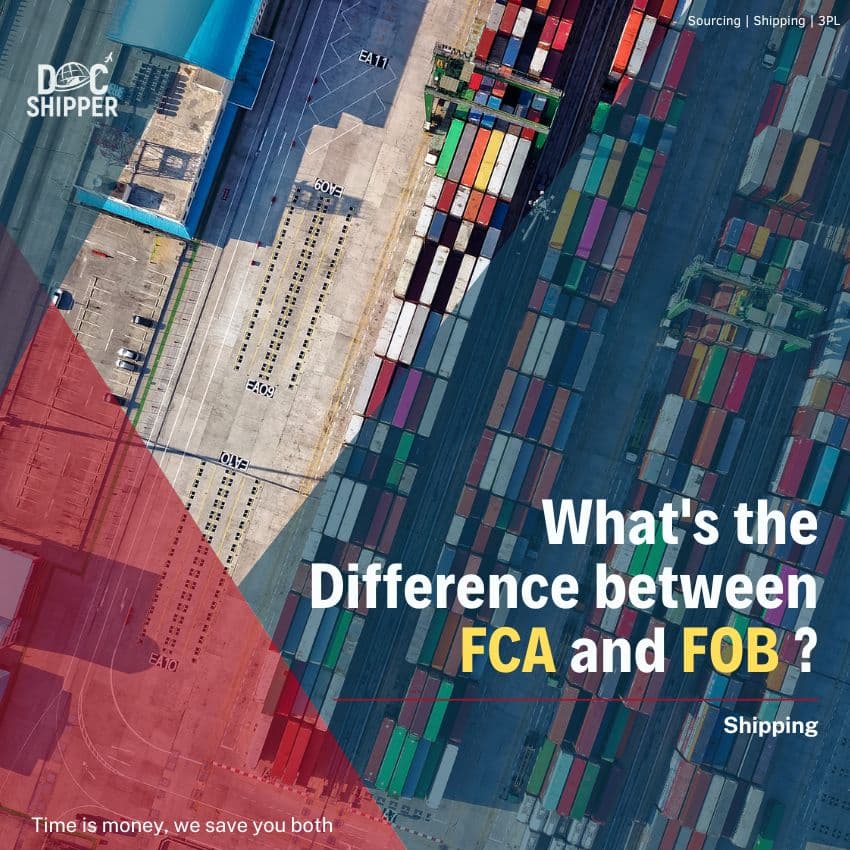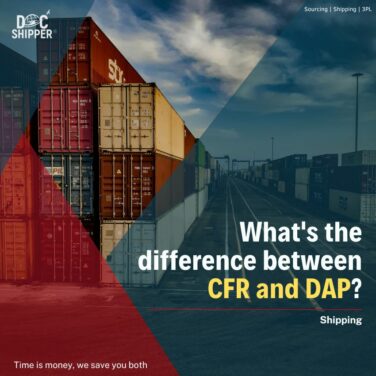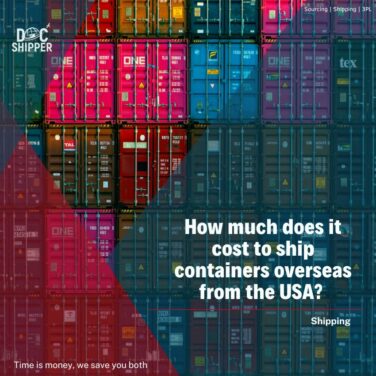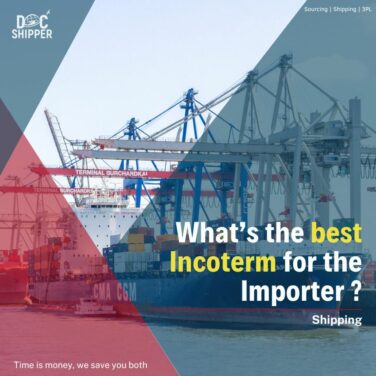In international trade, the use of standardized terms known as Incoterms plays a crucial role in defining the responsibilities and obligations of buyers and sellers during the transportation and delivery of goods. These terms establish important guidelines for both parties, ensuring a smooth and transparent transaction. This article aims to explore the distinction between two commonly used Incoterms: Free on Board (FOB) and Free Carrier (FCA). By delving into the details of these terms, we will uncover their meanings, costs, obligations, and risks.
Additionally, we will highlight the key differences between FCA and FOB and explain the significance of understanding these variances in international trade.
DocShipper Tip
DocShipper – We simplify shipping for SMEs, helping them effortlessly navigate freight transportation, customs clearance, and logistics, so they can focus on growing their business. Experience hassle-free shipping with us – click now to get started!
What does the Incoterm Free on Board (FOB) mean?
FOB represents one of the most frequently used Incoterms in international trade. It defines the point at which the seller completes their obligations and transfers the goods to the buyer. Under FOB, the seller is responsible for all costs and risks associated with delivering the goods to the port of shipment and loading them onto the vessel designated by the buyer.
Costs:

Regarding costs, the seller bears expenses up until the point of loading the goods onto the vessel. This includes costs such as packaging, transportation to the port, export customs clearance, and terminal handling charges. Once the goods are on board, any further costs, such as freight charges, insurance, and import customs clearance, become the responsibility of the buyer.
Obligations:
Under FOB, the seller’s primary obligation is to deliver the goods safely and in compliance with the agreed-upon contract. This includes ensuring proper packaging, arranging transportation to the port of shipment, and providing all necessary export documentation. The seller must also handle export customs clearance and deliver the goods to the agreed-upon port on time.
Risks:
The risk associated with the goods shifts from the seller to the buyer at the point of loading them onto the vessel. From that moment onward, any loss or damage to the goods becomes the buyer’s responsibility. The buyer is advised to obtain insurance coverage to protect against potential risks during transit.
What does the Incoterm Free Carrier (FCA) mean?
FCA is another widely used Incoterm that denotes a different set of responsibilities and obligations for both the seller and the buyer. Unlike FOB, FCA allows for greater flexibility in determining the point of delivery.
Costs:
Under FCA, the costs and expenses incurred by the seller vary based on the agreed-upon delivery point. The seller is responsible for covering costs up to that point, including packaging, domestic transportation, and export clearance. Any subsequent costs, such as freight charges, insurance, and import customs clearance, are the buyer’s responsibility.
Obligations:
The primary obligation of the seller under FCA is to deliver the goods, cleared for export, to the carrier appointed by the buyer at the agreed-upon place or point. The seller must ensure that the goods are properly packaged and labelled for transportation. They are also responsible for providing the necessary documentation for export clearance.
Risks:

Similar to FOB, the risk associated with the goods transfers from the seller to the buyer under FCA. The precise point at which the risk is transferred depends on the agreed-upon delivery point. It is crucial for both parties to clearly define the delivery point to avoid any misunderstandings or disputes regarding liability.
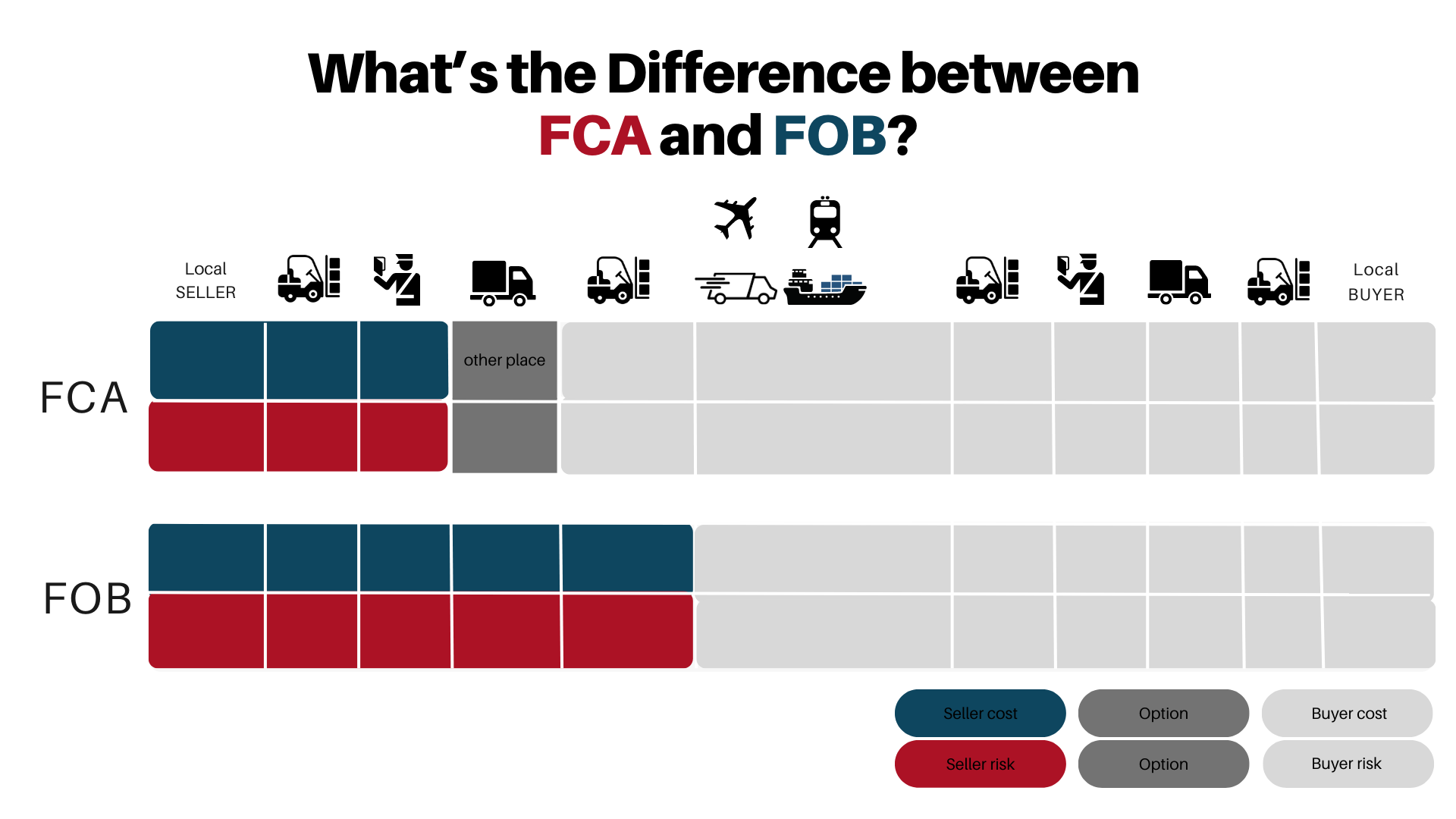
DocShipper Info
Trust the Experts for Smooth Delivery of Your Goods
Transporting your ordered goods internationally can be overwhelming, but it doesn’t have to be. Our comprehensive shipping solutions, combined with our in-depth knowledge of Incoterms, ensure a hassle-free experience from start to finish. Get a quote today!
What are the main differences between FCA and FOB?
While FCA and FOB share some similarities, there are several key differences between these two Incoterms. Understanding these distinctions is essential for effectively managing the risks and costs associated with international trade.
-
Delivery Point:
Under FOB, the point of delivery is the port of shipment, where the seller completes their obligations by loading the goods onto the vessel. In contrast, FCA offers more flexibility as the delivery point can be any agreed-upon location, such as a specific terminal, warehouse, or even the seller’s premises. This allows the buyer to have more control over the transportation and choose the carrier and mode of transport that best suits their needs.
-
Transportation Arrangements:
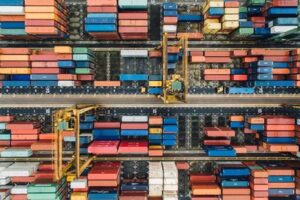
In FOB, it is the seller’s responsibility to arrange and pay for the transportation of goods to the port of shipment. Once the goods are loaded onto the vessel, the buyer takes over the transportation and bears the associated costs and risks. On the other hand, FCA places the responsibility of arranging and paying for the main carriage on the buyer, giving them more control over the logistics process.
-
Terminal Handling Charges:
FOB includes the seller’s obligation to cover terminal handling charges at the port of shipment. These charges encompass the costs associated with handling the goods at the port, such as loading them onto the vessel and any necessary documentation. In contrast, FCA does not explicitly require the seller to cover terminal handling charges, making it a potential cost for the buyer.
-
Cargo Insurance:
Another distinction between FCA and FOB lies in insurance responsibility. Under FOB, it is typically the buyer’s responsibility to obtain insurance coverage from the port of shipment. The risk of loss or damage to the goods transfers to the buyer once they are loaded onto the vessel. In contrast, FCA does not specify whether the seller or the buyer should arrange for insurance. It is crucial for both parties to agree on insurance coverage to protect against potential risks during transit.
Why is it important to understand the difference?
Understanding the difference between FCA and FOB is crucial for international traders to navigate the complexities of global commerce effectively. By grasping the distinctions, both buyers and sellers can make informed decisions regarding their responsibilities, costs, and risks.
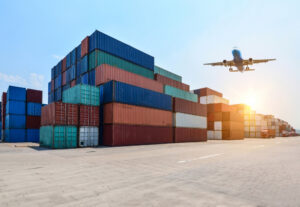
- Proper Risk Allocation:
Clear comprehension of the risk transfer points is vital to determine who is responsible for any loss or damage that may occur during the transportation of goods. FOB transfers the risk from the seller to the buyer at the port of shipment, while FCA’s risk transfer point depends on the agreed-upon delivery location. This knowledge allows traders to allocate risk appropriately and make necessary arrangements for insurance coverage.
- Cost Management:
Understanding the division of costs between FCA and FOB enables traders to plan their finances more effectively. By knowing which party is responsible for specific expenses, such as transportation, terminal handling charges, and insurance, both buyers and sellers can accurately estimate their financial obligations and negotiate favorable terms.
- Flexibility in Logistics:
The choice between FCA and FOB impacts the level of control and flexibility each party has over the logistics process. FCA allows the buyer to have more influence, as they can choose the carrier, mode of transport, and delivery location. FOB, on the other hand, provides a more straightforward approach with the seller taking charge of transportation to the port of shipment. Understanding these differences enables traders to align their logistics strategies with their business requirements.
Conclusion
Comprehending the variances between FCA and FOB is vital for international traders engaging in the global market. By understanding the meanings, costs, obligations, and risks associated with these Incoterms, traders can effectively manage their international transactions, mitigate risks, and optimize their logistics and financial planning. Clear communication, negotiation, and agreement on the chosen Incoterm ensure a smoother and more successful international trade experience for all parties involved.
DocShipper offers a range of services, including advice on selecting the most suitable Incoterm, managing logistics, coordinating transportation, and providing customs clearance support. With their knowledge and experience, they can help traders optimize their supply chain, minimize risks, and ensure efficient and cost-effective international trade operations.
DocShipper Alert
Let Us Handle the Paperwork while You Focus on Your Business
Don’t let customs documentation be a roadblock in your international trade journey. Our experienced professionals will take care of the paperwork, both in the country of origin and destination, so you can save time and avoid unnecessary headaches. Request a quote now!
FAQ |What's the Difference between FCA and FOB?
Read more
Looking for more? These articles might interest you:
DocShipper info: Do you like our article today? For your business interest, you may like the following useful articles :
Need Help with Logistics
or Sourcing ?
First, we secure the right products from the right suppliers at the right price by managing the sourcing process from start to finish. Then, we simplify your shipping experience - from pickup to final delivery - ensuring any product, anywhere, is delivered at highly competitive prices.

Fill the Form
Prefer email? Send us your inquiry, and we’ll get back to you as soon as possible.
Contact us







